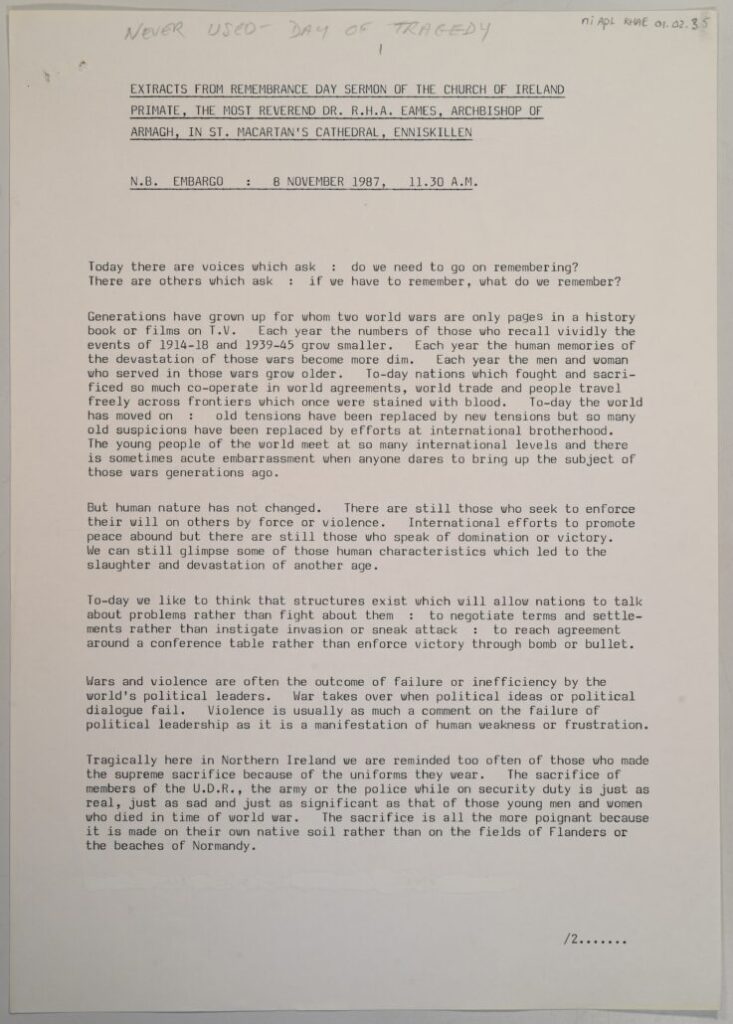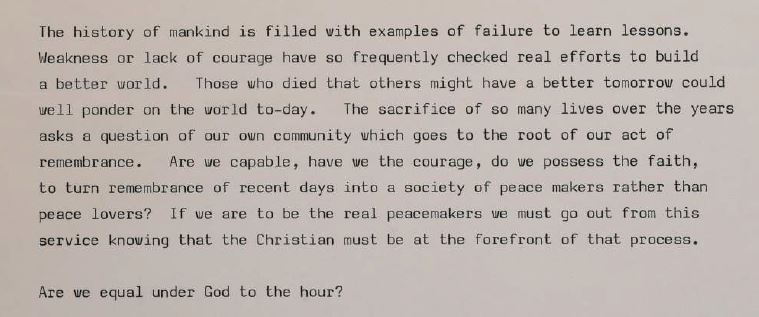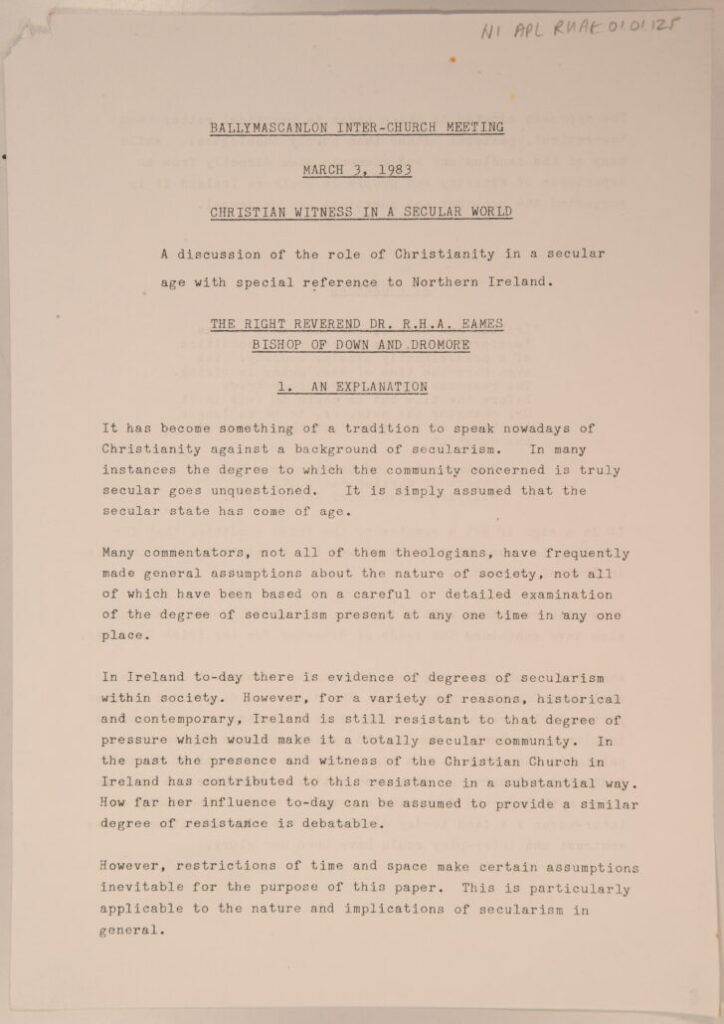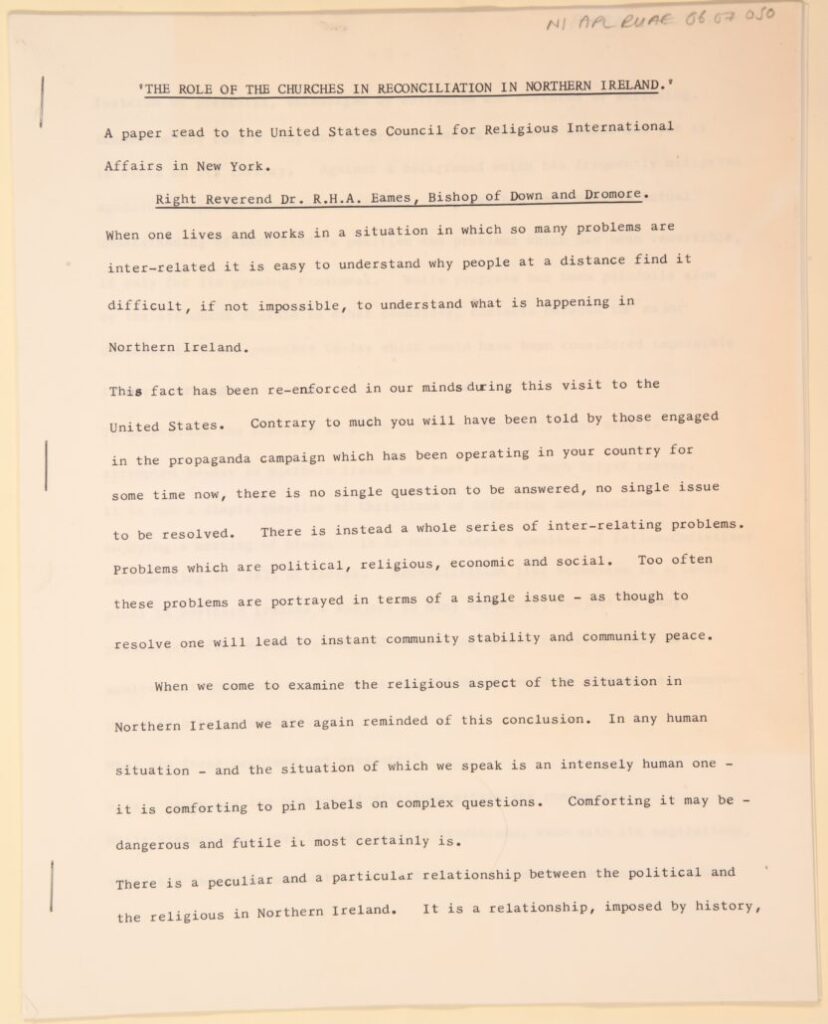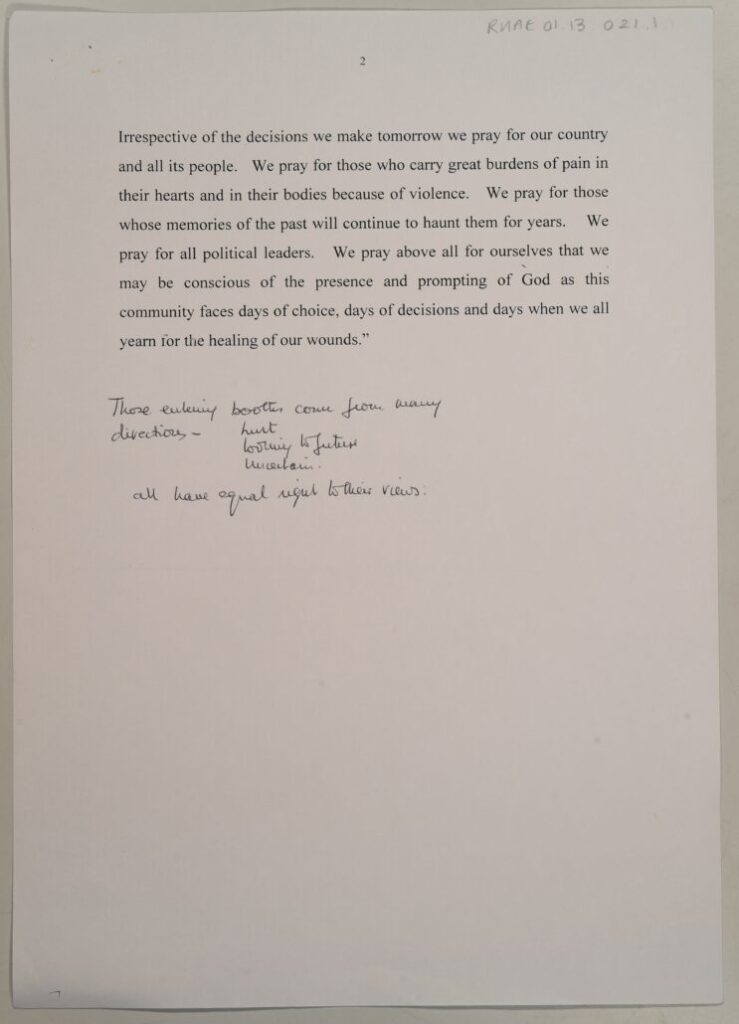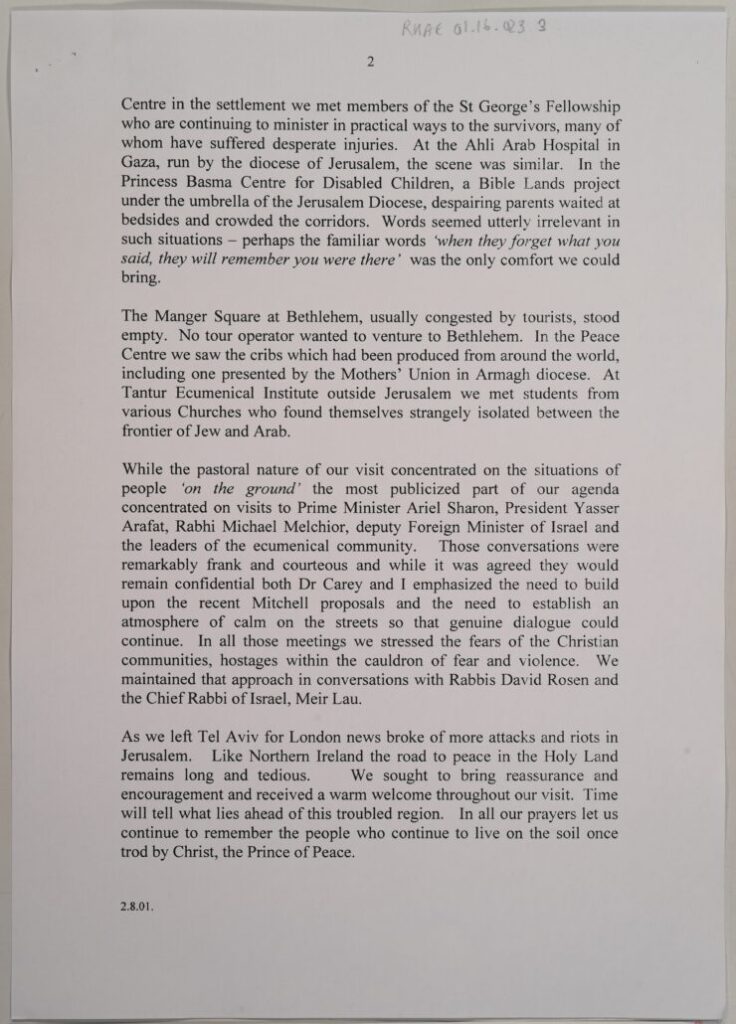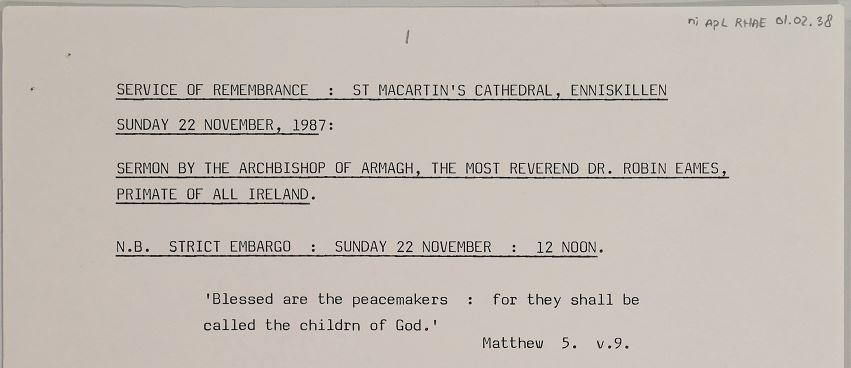Lord Eames was widely recognised for his role as a peacemaker. As Archbishop of Armagh he witnessed Northern Ireland move from the Troubles, through the peace process and the Good Friday Agreement, and played a central role, alongside Denis Bradley, as a co-chair of the Consultative Group on the Past.
An outstanding feature of this collection of papers is that The Rt. Rev. the Lord Eames’ public output often has contextualisation though press cuttings, making it a comprehensive resource for the researcher. Two prominent examples of this within the papers are the events and aftermath of the Enniskillen bombing on 8 November 1987, and the response to the release of the Report of the Consultative Group on the Past, widely known as the Eames-Bradley Report.
Lord Eames was also central to the peace and reconciliation process in Northern Ireland. As Archbishop of Armagh in a period which saw a transition from a conflict to post-conflict society, he was often at the centre of events.
There are numerous sermons from Troubles-related funerals, alongside material on policing, the dispute in his diocese around parading at Drumcree and the Garvaghy Road in Portadown, Co. Armagh, and in the lead up to the Good Friday/Belfast Agreement. Within all of these can be traced Lord Eames’ commitment to the Church’s role in promoting peace.
His work as a peacemaker begins before he became Archbishop of Armagh, and includes visits to the USA promoting investment and good relations, ecumenical work at events such as Ballymascanlon inter-church meeting in Co. Louth, and a visit to another region in conflict, Israel and Palestine, with the then Archbishop of Canterbury, George Carey, in 2001.
The Enniskillen Bombing
On 8 November 1987, Archbishop Robin Eames had been due to address the annual Remembrance Service at St. Macartin’s Cathedral in Enniskillen. The papers contain pre-prepared extracts from the sermon (RHAE_01_02_035_1) which was never delivered, as the bomb exploded before the service took place.
The handwritten note by Archbishop Eames at the top of the document provides a record of the events of the day, simply noting that it was a “day of tragedy.” Further exploration of related materials sheds more light onto the events. In his sermon on the 10th anniversary of the Enniskillen Bombing (RHAE 01.02.035), Archbishop Eames recounts his memories of the day: “As I recall Enniskillen ten years ago, even as I recall standing at the door of this Cathedral as we waited for a parade which did not arrive, the experiences of the rest of that day will never leave me.”
Supporting material from a scrapbook for the years 1986-1989 (search the catalogue for NI APL RHAE 06.21.002 to 06.21.016) provides newspaper content such as photographs, interviews, headlines and quotations from the day and the weeks following. In an Irish Times article by Joe Carroll (RHAE 06.21.003), Archbishop Eames was quoted, describing going immediately to the Erne Hospital where he “spent most of the day comforting the victims and helping grieving relatives” amid “terribly harrowing” scenes of which he said, “I pray never to see things like that again. Words fail to describe it.” Items can be viewed in person at Armagh Robinson Library.
Archbishop Eames’ sermon at the rescheduled Remembrance Service on 22 November 1987 (RHAE 01.02.038) reflects on Matthew 5:9, “Blessed are the peacemakers: for they shall be called the children of God.” Later he says, “There can have been few Remembrance Services where people have been as conscious of the need to re-dedicate themselves to peace.” In praising the response to the Enniskillen Bombing he highlights the efforts of the community to seek unity rather than division, and weaves the traditional Remembrance theme of reflecting on conflict and service with looking to the goodness in humanity, lessons to be learned and the importance of a better future.
The Eames-Bradley Report, or the Report of the Consultative Group on the Past
At the time of his appointment as co-chair of the Consultative Group on the Past, Lord Eames had retired from his role as Archbishop of Armagh. Denis Bradley, an ex-priest and ex-vice chair of the Northern Ireland policing board, was his co-chair. The Consultative Group on the Past was established to deal with the legacy of the Troubles in Northern Ireland, engaging with groups from across Northern Ireland in order to make recommendations for the transition to a post-conflict society.
The launch of the Eames-Bradley report on 28 January 2009 at the Europa Hotel was followed by controversy, as some of the recommendations therein were met with disapproval. This section of the Eames Papers is invaluable as it features articles, opinion pieces and striking photographs from the press conference at the Europa Hotel, Belfast.
At the time these were collated for Lord Eames to provide an overview of the public response, but they now form a comprehensive resource of press coverage and public response following the release of the report; search the catalogue for reference number NI APL RHAE 04.04 for the full results. Items can be viewed in person at Armagh Robinson Library.
Ecumenical and peace-building work in Northern Ireland and abroad
Robin Eames was involved in ecumenical and peace-building work throughout his episcopal career. He was a regular attendee at the inter-church meetings at Ballymascanlon, Co. Louth. In 1983, when he was Bishop of Down and Dromore, he gave an address with the title “Christian Witness in a Secular World: A discussion of the role of Christianity in a secular age with special reference to Northern Ireland,” (RHAE 01.01.125) in which he reflects on the multiple issues at play in Northern Ireland including the impact of the Troubles, economic hardship and its social impacts, unemployment, addiction, education, and considering how the Church can serve a secular, pluralist society.
The impact of economic issues alongside the Troubles are a theme which permeates Eames’ work in the 1980s and 1990s. The recognition that investment and economic success helps to uplift all of society through creating opportunity is clear not only in addresses to local organisations such as the Northern Ireland Chamber of Commerce (RHAE 01.05.054) or Belfast Rotary Club (RHAE 01.17.001) but also further afield, particularly during his visits to the USA such as a paper read to the United States Council for Religious International Affairs in New York in 1981.
Archbishop Eames’ work as a peacemaker came into focus during the conflict at Drumcree/Garvaghy Road in Portadown, Co. Armagh. His statement of 9 July 1996 (RHAE 01.11.034) shows an acknowledgement of the feelings of both sides, and the importance of working towards solutions. The conflict continued into 1998, the year of the Belfast/Good Friday Agreement, in which Archbishop Eames and his Roman Catholic counterpart, Cardinal Sean Brady, released a joint statement (RHAE 01.13.023) calling for accommodation and a peaceful and just outcome. Just the month before, Archbishop Eames had been building the groundwork for the referendum on the Good Friday Agreement. As previously seen in the never-used address on the day of the Enniskillen bombing, it is the handwritten annotation that is most telling. In an address to a Service of Prayer in St. Anne’s Cathedral, Belfast (RHAE 01.13.021), he writes of Christian unity, and prays for guidance for the referendum. The handwritten note at the end adds: “Those entering booths [to vote] come from many directions – hurt, looking to future, uncertain – all have equal right to their views.”
Archbishop Robin Eames’ work in peace and reconciliation had a wider focus than just Northern Ireland. In July and August 2001, Archbishop Robin Eames and the then Archbishop of Canterbury George Carey conducted a pastoral visit to Israel and Palestine at the request of the of Bishop of Jerusalem Riah Abu El-Assal. Material from that visit includes Archbishop Eames’ notes for an address on the theme of reconciliation at St. George’s Cathedral, Jerusalem (RHAE 01.16.023.01), and a statement following meetings with the leaders of Israel and Palestine, Ariel Sharon and Yasser Arafat (RHAE 01.16.023.02). The final document ((RHAE 01.16.023.03), “We Came to Jerusalem: Archbishop Eames reflects on his pastoral visit to Israel and Palestine,” gives his personal account of the visit.
He draws parallels with Northern Ireland’s peace process, and acknowledges the importance of dialogue. Lord Eames’ reflections have enduring resonance in 2024, given the current escalation of conflict in the region.
The lasting importance of peace-building is a theme that runs throughout the Eames Papers.
In recognising the importance of bringing all members of society together to resolve conflict, his work embodies the vision for reconciliation he proposes using the Bible verse from Matthew 5:9 in his sermon of Remembrance in Enniskillen following the bombing of 1987: “Blessed are the peacemakers.”
For detailed catalogue descriptions of the items below, please go to the Eames online catalogue and using the numbers below.
To view images, or the scrapbooks in their entirety, an appointment can be made at Armagh Robinson Library.

